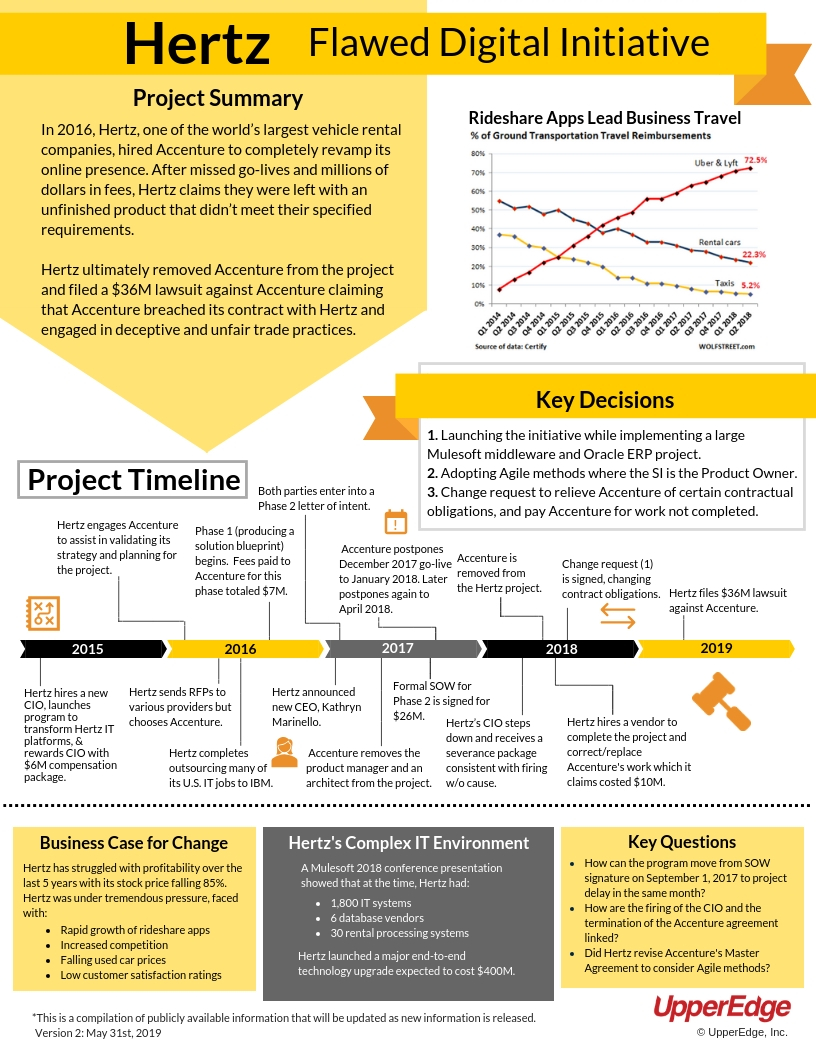- John Belden
- Reading Time: 7 minutes

This blog was updated on June 5th, 2019 to include the latest court orders.
Hertz Files $36M Suit Against Accenture for Flawed Digital Initiative
On April 19, 2019, one of the world’s largest vehicle rental companies, Hertz, filed a breach of contract lawsuit against Accenture, a global management consulting and professional firm that provides strategy, consulting, digital, technology and operations services. The complaint, filed in the United States District Court for the Southern District of New York, alleges that Accenture breached its contract with Hertz and engaged in deceptive and unfair trade practices. Hertz claims that this alleged breach resulted in significant harm and is requesting full reimbursement of fees paid as well as other damages.
UpperEdge’s Project Execution Advisory Service follows and reports on these types of suits for our clients. There are always lessons to be learned and risk mitigation tactics that can be developed from implementation failures. As always, there are more questions than answers in the early stages of these proceedings. We will lay out what we know so far and conclude with what we would like to know and what we hope to find out through future litigation filings.
Blog continued below…
Project Background
Hertz operates the Hertz, Dollar, and Thrifty vehicle rental brands and has approximately 10,200 corporate and franchisee locations throughout North America, Europe, the Caribbean, Latin America, Africa, the Middle East, Asia, Australia, and New Zealand. Faced with the rapid growth of rideshare apps, increased competition, and falling used car prices, Hertz has struggled with profitability over the last 5 years with the stock price falling 85%. The company has replaced its CEO twice over the last 5 years, most recently at the start of 2017.
Hertz’s IT environment is very complex. From a recent Mulesoft 2018 conference presentation, we learn that Hertz at the time had 1,800 IT Systems, 6 database vendors, and 30 rental processing systems. The company launched a major end-to-end technology upgrade that included outsourcing the legacy systems and designing and building a cloud-based infrastructure for Hertz’s five core platforms: digital, CRM fleet management and fleet accounting, reservation, and rental. The overall cost of the program was expected to be in excess of $400M.
From the lawsuit filed and our research, we learn more about the specific project:
- Hertz was looking to redefine the customer experience of its market leading brand, specifically the Hertz website and mobile applications.
- The platform to be developed was intended to be readily extendable to other Hertz brands, including Dollar and Thrifty.
- The program appears to have adopted an agile-based methodology with the use of product managers and the application of sprints to deliver iterations of the product.
- Hertz was at the same time implementing a large Mulesoft middleware and Oracle ERP project to upgrade the firm’s transaction processing capabilities.
The Time Line
The timeline laid out in the lawsuit and enhanced by our research picks up in early 2016 following a review of the company’s website and mobile applications:
Jan 2015 – Hertz hires a new CIO and launches program to transform Hertz IT platforms. Hertz rewards CIO with $6M compensation package that included a bonus for his 2015 accomplishments which included: developing an IT strategy, recruiting experienced IT professionals, implementing cyber security enhancements, and adopting cost-saving technology arrangements including a deal with IBM that was intended to significantly reduce Hertz’s spending on legacy systems.
March 2016 — Hertz engaged Accenture to assist in validating its strategy and planning for the project. The engagement was governed by a consulting services agreement between Hertz and Accenture that had been in place since 2004.
Summer 2016 – Hertz requested proposals from several of the leading technology services providers. They eventually selected Accenture, relying on Accenture’s claimed world class expertise in website and mobile application development.
Summer 2016 – Hertz completes outsourcing many of its U.S. IT jobs to IBM in efforts to cut back office costs
August-November 2016 – Accenture and Hertz engaged in a Phase 1 of the project producing a “solution blueprint” that would describe the functionality, business processes, technology, and security aspects that were to be incorporated into the solution. Fees paid to Accenture for this phase totaled $7M.
January 3, 2017 – Hertz announced new CEO and board member, Kathryn Marinello.
January 30, 2017 — Accenture and Hertz entered into a Phase 2 letter of intent to document specific design, build, test, validate, and to deploy the website, mobile applications, and other deliverables.
May 2017 – During an Investor presentation, Hertz commits to delivering “Modernized e-commerce platform” by the end of 2017.
Summer 2017 – Accenture removed the product manager and a project architect from the project.
September 1, 2017 — Accenture and Hertz sign a formal SOW agreement for Phase 2 with fees totaling $26M for this portion of the project. Through this contract, Accenture agreed to provide “project management” services, including Accenture’s obligation to “plan, control, and lead the execution of Accenture’s scope of services.” The agreement included language regarding “a focused objective of launching the [website and mobile applications] platforms and experience in December 2017.”
September 2017 – Accenture reported that it would not be able to meet the December 2017 go-live date and requested that it be pushed back to January of 2018. Not long afterward, the go-live date was further postponed until April of 2018.
Q4 2017 – Hertz and Accenture sign first change order. According to Accenture, this change order altered the party’s responsibilities under the Phase 2 SOW and included a broad release in which both parties release any claims “arising out of or related to the need to provided Services beyond” the Project estimated December 2017 launch date, and that they would not bring any suit related to delays in the Project.
Q1 2018 – Hertz paid Accenture for the work contracted under the SOW and the first change request (CR). A second CR is signed for Accenture to provide additional services for Hertz for an agreed-upon amount of fees.
April 2018 – Hertz’s CIO steps down and receives a severance package that is consistent with firing without cause. CEO takes over on interim basis.
May 2018 – Accenture is removed from Hertz project.
June 2018 – Hertz hires a new vendor to complete the project. Hertz claims to have spent an additional $10M in fees to correct or replace the work product produced by Accenture.
July 2018 – Hertz hires new CIO that joins the company from Allstate Insurance.
April 19, 2019 – Hertz files lawsuit against Accenture.
May 2019 – Accenture submits statement that the damages should be limited to only Accenture’s direct damages capped by Accenture fees and further that Hertz’s claims are barred by the mutual release that both parties entered into as part of the first CR signed for Phase 2 SOW. Hertz responds that the releases agreed expressly exclude breach of warranty.
June 4, 2019 – Judge issues scheduling orders that sets trial date for March of 2020.
Claims made by Hertz
Paraphrased from the suit, Hertz is claiming damages of more than $32M due to the following counts:
Count 1: Breach of Contract – claiming that:
- Accenture did not perform the services in a good and workman-like manner.
- Deliverables prepared and delivered by Accenture did not materially conform to their specifications at the time of delivery.
- Accenture refused to remedy the defects in its services and deliverables.
In support of this claim, Hertz referenced the lack of testing or only selective or “happy path” testing.
Count 2: Deceptive and Unfair Trade Practices — claiming that Accenture mispresented its abilities to perform Hertz’s digital transformation. Hertz stated that Accenture:
- Elected without consulting Hertz to not provide extensible code as contracted.
- Did not provide a fully responsive website excluding tablet formats.
- Provided a static visual style guide vs. a dynamic guide as promised.
Hertz further alleges that Accenture engaged in unfair, deceptive, and extortionate conduct in connection with these breaches.
Questions We Would Like to Know the Answers To
As with any lawsuit, there are at least two sides to every story. As I was reviewing this claim, I started to ask myself a few questions that will need to be answered to understand what really happened.
- What amendments were made to update a services agreement signed in 2004 to align with agile delivery methods?
- Why did it take eight months to move from a letter of intent to a SOW for Phase 2?
- Did the delay in agreeing to the Phase 2 SOW allow Accenture to remove key personnel without penalty on the agreement of Hertz?
- How can the program move from SOW signature on Sept 1, 2017 to project delay in the same month?
- Where was Hertz? Surely there were intermediate deliverables and signoffs that were required to move forward at the end of each sprint or product increment.
- Why were the problems and issues associated with the program not identified in a properly executed risk management process?
- How are the firing of the CIO and the termination of the Accenture agreement linked?
- How many of the issues and delays were attributable to integration issues directly related to Hertz’s Oracle deployment?
- Why would Hertz allow Accenture to step into the product owner’s role for a project that was so customer-facing and brand-critical?
What the Future Holds
Some firms will rush to publish a set of points on how this fiasco could have been avoided, however as I have learned, it is important to obtain both sides of the story before rushing to conclude what went wrong. On June 4th, Judge William Pauley in the Southern District of New York provided a trial schedule that hints at when we will know more about this case. Trial dates include:
July 15th, 2019 – Accenture required to provide its answer to charges or specific requests on motions to dismiss Hertz’s complaints.
Sept 12th, 2019 – Both parties will appear before the judge to provide oral arguments on the legitimacy of Hertz’s complaint and Accenture’s motion to dismiss.
Nov 15th, 2019 – Fact discovery is scheduled to be completed. This is almost certain to be extended as the process of fact discovery in these types of cases tends to be a long an protracted process.
Jan 31st, 2020 – Expert witness depositions have to be completed.
Feb 21st, 2020 – Pre-Trial conference to be held. These types of conferences are typically held two weeks prior to trial.
UpperEdge will keep our eyes on this case to develop a deeper understanding of what went wrong. If you have any questions or comments, please do not hesitate to contact jbelden@upperedge.com.
Comment below, follow me on Twitter @jmbelden98 find my other UpperEdge blogs and follow UpperEdge on Twitter and LinkedIn.
Related Posts
Related Blogs
Why You Are Accenture, Deloitte, IBM, and PwC’s #1 Priority—But Not in a Good Way
How Accenture’s Strategy Evolved in 2020
How 25,000 Accenture Layoffs Will Impact Customers
About the Author

